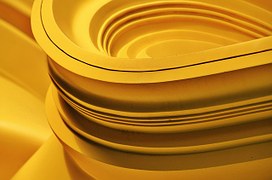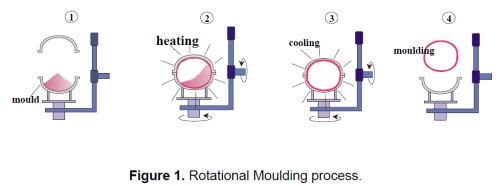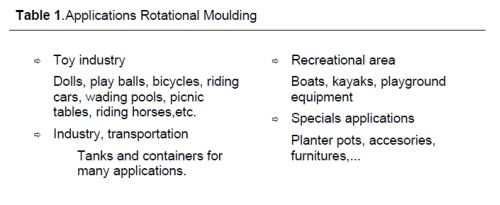Can we help you?
Contact us

Can we help you?
Contact us

Thank you for contacting us
Your form has been submitted successfully Our team will contact you again as soon as possible.
Whooppss...!! An error has occurred
Try sending later or write an email directly to areaempresas@ua.es

INFO
SHEET
DOWNLOAD
EXECUTIVE
ABSTRACT
CONTACT DETAILS: Research Results Transfer Office-OTRI
University of Alicante
Tel.: +34 96 590 99 59
Email: areaempresas@ua.es
http://innoua.ua.es
Rotational moulding is a technique for the transformation of plastics in hollow articles such as doll’s heads, tanks, containers, gloves, etc. The technique allows to obtain small parts of a few grams as well as containers of more than 20000 liters of capacity. Foamed parts, multi-layer mouldings or soft mouldings without joining lines can also be produced, what gives an idea of the versatility of this technique. Inversions and costs of production are very low when compare with other plastics processing techniques as injection moulding or blow moulding.
The group of plastics of the Chemical Engineering Departament of the Alicante University is working on rotational molding of plastics since 1990. From this year to the present a great number of research projects for the industry have been developed. The group has a high experience, expertise and know-how in cycle reduction, authomatization, wastage reduction, formulation optimization, pigmentation, double skin products, soft foamed materials and production of parts with special features as wood-like or skin-like appearance.

The rotational molding process consist in four steps, as illustrated in Figure 1. A given amount of plastic, either in powder or liquid form, is deposited in a mold. After closed the mould is rotated biaxially in an oven. The plastic melts and forms a coating over the inner surface of the mold. The mold is removed from the oven and introduced in the cooling area, and finnally the mold is opened and the hollow part is removed.

The moulds and machines employed in rotational moulding are relatively inexpensive when compared with the equipment employed in the processing of plastics by other techniques. The technique allows to run simultaneously moulds of different size and shape. Rotomoulded products are virtually stress-free since no pressure is used and no weld lines or sprue marks are caused by processing. Intricate contours, foamed parts and double skins can be easily rotomoulded. Wall thickness uniformity is good compared with products processed by thermoforming or blow moulding.
In spite the machines and moulds used in the rotational moulding process are quite simple, in order to obtain products of the best standard a high knowledge of the behaviour of the materials during processing is required. There are some problems associated with the moulding obtained by this process if precautions are not taken. Porosity and bubbles content, thickness distribution, pigments distribution, cycle time, warpage or shrinkage can be important depending on the flow capacity of the material selected, heating rate, cooling rate, mould material and rotation rate. All this variables must be carefully selected in order to avoid the mentioned problems. Parts with special features also required a study prior to production.
The group of plastics of the Chemical Engineering Department of the Alicante University has developed more than 15 research projects (public European and Spanish projects, as well as for the industry) in topics related to the rotational moulding process.
The group has been working in the optimization of cycles in polethylene mouldings in order to reduce warpage and shrinkage and optimization of formulations of polyvinyl chloride (PVC) plastisols in order to improve the mechanical properties and the aspect of the mouldings. The substitution of PVC by plastics with similar characteristics to produce environmental friendly products has also been studied, although the costs associated are most competitive with PVC. Cycle reduction by improving heating and cooling systems, has been studied. In this sense a microwave machines and special moulds for this process has been developed. A new system for pigmentation that allows a save of pigment obtaining mouldings with better mechanical properties and pigment distribution has also been developed. The production of double skin products and foams has also been studied. Products with special features as wood-like or skin-like appearance have also been studied.
The variety of products that can be rotomoulded is very high, and can be summarized as follows:

Different types of cooperation are sought by the Department of Chemical Engineering of the University of Alicante:
- Consulting services for companies which are working or expect to work with rotational moulding.
- Development of projects on optimization of the production of rotomoulded products, development of formulations.
- Know-how transfer in rotomoulding.
The Department of Chemical Engineering owns the know-how to produce mouldings of the higher standard. Protection by patent is not applicable.
The research team responsible for this new technology are all members of the Department of Chemical Engineering in the University of Alicante, consisting of: 5 senior professors, 9 full-time professors, 10 part-time professors, 4 assistants, 12 grant-holders and 6 members of the administrative staff. Our main research fields are:
- Pyrolysis, Gasification and Incineration
- Environmental Water Management
- Environmental Managemente of Industrial Waste
- Synthesis and Optimization of Chemical Processes
- Rectification and Extraction of Multicomponent Mixtures
- Activated Carbon
- Balance between Solid-Liquid-Liquid-Solid Phases
- Holographic Interferometry
- Polymer Processing
- Food Technology
- Time of Stay Distribution in Electrochemical Reactors
- PCDD/PCDF Detection and Analysis
Chemical Technology
Transport and Automotive
Carretera San Vicente del Raspeig s/n - 03690 San Vicente del Raspeig - Alicante
Tel.: (+34) 965 90 9959




